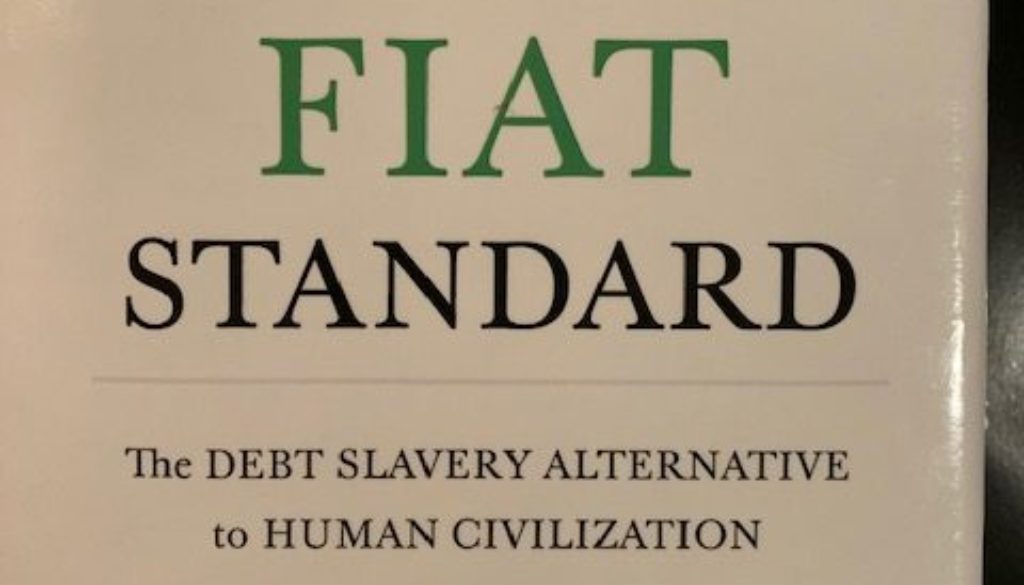The Book I Wish I’d Written

Auburn, AL
July 12, 2022
“The level of spending and income in America may be increasing according to government statistics, but if Americans work longer hours than they ever did and their basic nutrition is deteriorating, there must be something seriously wrong with the money they’re using, both as a store and measure of value.”
– Saifedean Ammous, The Fiat Standard
Milton Friedman famously referred to inflation as “always and everywhere a monetary phenomenon.”
And it is.
But it’s also a moral (or, rather, an immoral) one, with disfiguring implications extending far beyond broad increases in the price of goods.
A few years ago, Saifedean Ammous wrote the definitive book on Bitcoin. Several months ago, as a follow-up, he released a wonderful overview of the scourge that Bitcoin was programmed to replace.
The Fiat Standard is the book I wish I‘d written. Not that anyone would’ve read it if I had. But everyone…or at least those among us who want to understand how the world works…should read what Ammous wrote.
He elaborates in clear and compelling language…using logical reasoning and irrefutable examples…the origin and nature of money, and how the economic principles so eloquently explained by Menger, Mises, and Rothbard affect all aspects of any culture – whether we like it or not.
The key insights of these “Austrian” economists derive from human action under conditions of scarcity. And as true economists, they acknowledge the preeminence of time preference, and its continual reduction as the defining characteristic of advancing civilization.
Saifedean Ammous is steeped in the Austrian school of economics…which is to say, of economics. He disdains the court Keynesians who developed “macroeconomics” into the pseudoscientific equivalent of what “public health” experts made of epidemiology.
Under Keynesian influence, like a bad striptease, the dollar spent six decades slowly shedding the chastening garment of constrictive gold. In 1971, the last tassel was tossed aside. On that date, fiat money was fully exposed as a floating abstraction. Almost immediately thereafter, it began its descent.
Fiat money is a melting ice cube and a hot potato. It rewards debt, punishes thrift, and makes suckers of savers. Whereas real money encourages thrift, capital investment, and reduced time preference, fiat promotes short-term thinking and perpetual debt.
In fact, fiat money is debt. Fiat currency comes from commercial banks extending credit and making loans. It disappears when those loans are called in, repaid, or go bad.
And as in any counterfeiting ring, those who are nearest the spigot get the most to drink. Everyone else just gets soaked.
The fiat standard is a funhouse mirror that makes cash a liability, pretends opportunity costs don’t exist, and assumes time preference (which free markets reflect thru interest rates) works in reverse. Success in this system entails borrowing money to accumulate assets, or issuing credit to get others in debt.
The pseudo-economic “thinking” affirming this scheme is that a diluted, debt-addled currency will discourage saving and stimulate risk to promote “investment.”
But this, as Ammous explains, conflates credit with capital. Investment requires (but is not synonymous with) savings, which can only accumulate by deferring consumption. Extending loans at arbitrary interest creates no new capital. It merely reallocates the existing pool to less desirable projects.
But the fiat pox does much more than raise prices, cause mal-investments, punish savers, and create boom-and-bust cycles (bad as those are). It also has cultural consequences. The Fiat Standard strips the veneer of propaganda from the planks of fiat, exposing how it splinters and rots every aspect of life.
Money may often be the mother of commerce. But it can also be a deadbeat dad. And when it goes, as Bill Bonner put it, everything goes. It leaves behind a dilapidated, disposable world that looks a lot like the one we endure today…a present-oriented orgy of debt, debauchery, mass consumption, increased crime, broken families, destructive fads, and capital decay.
Free market, hard money prices aren’t merely numbers or amounts. They’re information, and a communication mechanism. A monopoly fiat currency jams the signal. It enables the State to muddle and meddle in every aspect of life, accruing benefits not to those who provide productive services on a free market, but to connected connivers who are experts at playing the political game.
And its delusions overflow like parking lot dumpsters. Fiat disguises the natural necessities of giving to get, rendering to receive, and working for reward. Being phony cash conjured from thin air, it provides the tempting illusion that trade-offs are irrelevant and opportunity costs don’t exist.
When consequences are camouflaged, today is all that matters. So people borrow and spend like there’s no tomorrow. And they treat their health, relationships, morals, and manners the same way.
Fiat society comes to believe it can have the bender without the hangover, the fling without the divorce, the harvest without the planting, and that we can all go to Heaven without anyone having to die. Yet death comes to us all, and to every fiat standard that’s ever existed. But while it survives, it provides plenty of pavement for the road to Hell.
Under bad money, the very foundations of civilization are sacrificed in the smoldering volcano of the fiat standard. The manners, morals, and decency inherent to sustain society wither away as time preferences are buoyed higher on an inflationary flood.
Amid the torrent, family and Faith are prone to drown. These pillars of society are natural enemies of the predatory State. A healthy society places kin before government, and God above it…which the powers-that-be cannot abide.
As Ammous notes, forming a family and adhering to a religion require long time horizons, either multiple generations, or for all eternity. The Faithful resist temptation in order to honor God. Parents sacrifice present pleasures to facilitate a future for their children…and also for themselves, for whom their grateful kids provide old-age care.
An inflated currency inhibits the ability of a family to sustain itself. And this phony money enables the State to assume responsibilities the family historically shouldered. As it does, the rationale for couples to stay together, bear the burden of raising kids, or to care for their elders is significantly reduced. Families separate, shrink, and subside in the shadow of fiat subjugation.
As fiat money causes societal disruption, it provides its practitioners with excuses and diversions to cover it up. Its detrimental consequences become their own rationale to blame others for its effects, and to promote self-serving policies that the Fiat Regime wants to impose.
Fiat contaminates science to coat corruption with the luster of legitimacy. Under fiat funding of government “science”, acceptable “experts” are no longer experienced practitioners who have deep knowledge in a particular field. Instead, with government permeating every cranny of society, the designated “authorities” are now state-sponsored charlatans whose only qualification is that they are intimately familiar with what they are paid to say.
The results being pre-determined, the role of “science” is to manipulate models to concoct the “evidence”. If you come up with conclusions the government wants to hear, you get more funding. If you don’t, you won’t. And not only will you not be promoted, you’ll be silenced…and shunned.
As Ammous puts it, he who defines the null hypothesis gets what he wants. And that hypothesis is usually defined by political donors and corporate sponsors who benefit by assuring that the “scientific consensus” parrots their pre-conceived conclusions. Under a fiat standard, statistics becomes a fraudulent “science” designed to hide reality. We’ve seen unremitting evidence of this the last couple years.
Thru several illuminating chapters describing “fiat life”, Ammous explains how made-up money disorients, degrades, or destroys science, education, academia, families, food, soil, energy, and architecture. It is then deployed to divert attention from its integral role in causing of the calamity. This has been underway at least since the inflationary 70s, and is becoming particularly pronounced today.
When fiat inflation raises prices for nutritious animal foods on which humans have always thrived, consumers are blamed for not eating more processed by-products of industrial waste. Agricultural corporations and packaged food companies fund “scientific” studies to convince consumers that their processed grain and corn-sweetened slop are not only cheaper than animal-based alternatives, but that they are healthier too!
Fatuous government-funded “food pyramids” follow. When purchases shift from healthy meats to corrosive seeds, inflation is hidden and health declines. As inferior alternatives replace high-quality food, politicians can disguise the obvious effects of their inflationary policy. By spending less on poisonous replacements, consumers mitigate the pain of higher prices while being led to believe they are improving their health.
But this is another example of how fiat money subsidizes the present by confiscating the future. Eventually, the bill comes due. By demonizing red meat, eggs, and other nutritional essentials of the human diet, fiat officials betray human health to buttress political benefactors.
Yet the long-term cost to care for millions of new diabetics, heart patients, and cancer sufferers created by “cheap” fiat foods far surpasses any added expense of nutritious red meat. Almost unheard of a century ago, these once-rare diseases increased in prevalence after animal proteins were actively discouraged. Now, like inflation itself, these maladies are commonly accepted as almost unavoidable components of modern life.
But animal foods are castigated not merely for hindering human health. They are also accused of destroying that of the planet! Grazing herds are apparently calamitous for the earth, while pesticide-laden industrial farms are apparently just what it needs.
And we are assured by the billionaires buying-up vast agricultural acreage that the seed, oil, and grain-based diets by which they would profit will provide nutritional benefits superior to beef, while keeping the temperature under control. The fiat system claims to offer many ways to “preserve the planet”, all of which coincidentally accrue more power to those who run it.
As its practitioners pretend we can have beef without the cow, they also promise us reliable power without hydrocarbons. Instead of tapping the miraculous abundance of what Ammous accurately calls “nature’s batteries”…energy-dense hydrocarbons that deliver reliable power on a whim of desire…we should put on sweaters, live in pods, ride our bikes, and receive intermittent energy from primitive sources…primarily wind and solar.
But hydrocarbons are solar. Yet unlike the raw energy of the sun’s rays, they’ve been packed by time into potent “batteries” that provide the economical power necessary to satisfy our needs. They don’t require the complex processes, inefficient mandates, and expensive subsidies that render “renewable” energy such a fickle source and colossal waste.
Most white elephant “renewable” energy resembles a gardener trying to plant cut flowers. It isn’t feasible without reliable power from hydrocarbons, hydropower, or nuclear sources. Renewables rely on laundering dependable, high-powered hydrocarbons thru boondoggle facilities that are superfluous to the grid. Until wind farms and solar panels can be constructed from wind or solar energy, they are merely expensive, elaborate ways of wasting hydrocarbons. They’ll remain as incompatible with modern life as an Adams apple is to shaving.
As in the 1970s, the current energy crisis is entirely fueled by fiat inflation. But like they’re doing with the Ukraine invasion today, those responsible for the earlier episode blamed foreign events for high prices and rampant shortages. Fiat funds war, and war funds fiat. But, like today, fuel prices in the 1970s rose precipitously before geopolitical events provided an added impetus and a convenient excuse. And the increases persisted for years afterward.
The latest fiat inflation not only increased prices by counterfeiting the currency, but exacerbated the situation by facilitating Russian sanctions, punishing reliable hydrocarbons, subsidizing sub-optimal energy, and enabling calamitous covid responses that crippled distribution. And as with the increasing cost of essential foods, rising prices of indispensable fuels enables connected chiselers to promote their self-serving alternatives.
If these hucksters can convince enough useful idiots that energy consumption is detrimental to humanity, they can appear to control the effects of their inflation. And, to be fair, the CPI will no doubt decline if we reverse the industrial revolution, and accede to live like modern Malawi or Medieval peasants.
The planet will be indifferent and its temperature unaffected. But prices will fall as billions are unnecessarily immobilized, frozen, or starved to death. To paraphrase Rabelais, humanity will be hiding in water for fear of the rain.
Fiat facilitates the naive notion, as Ammous puts it, that we can have apples without the apple tree…that we can have central air, mobile phones, Zoom calls, refrigerators, modern transportation, medical equipment, and all the other amenities and necessities of modern life without the hydrocarbons short-sighted zealots want us to forgo.
The greatest defect of the infantile fiat philosophy is, as AJ Ayer said of his own life’s work, “that nearly all of it is false.” But in analyzing it, Saifedean Ammous is fair enough to include a review of its advantages amid the examination of its problems.
He also offers a solution, which is detailed in the last third of The Fiat Standard. Those who are familiar with Ammous’s work can guess what it is. Those who don’t will have to buy the book.
They’ll be glad they did.
JD



